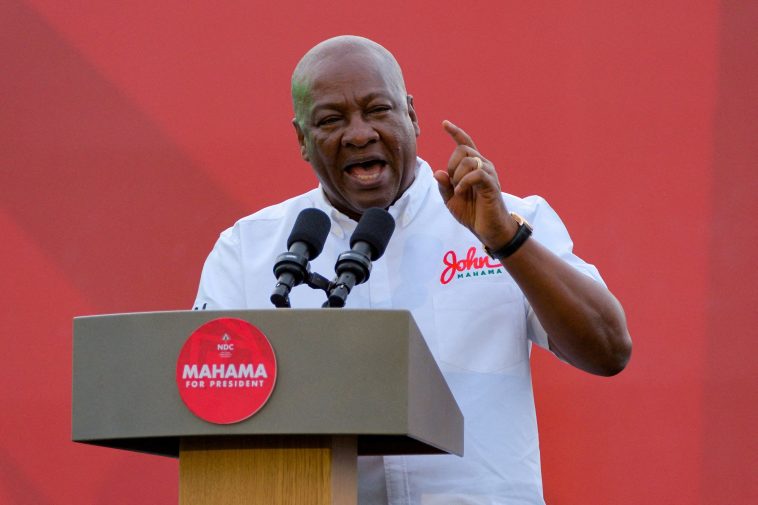Election day came to a close on Saturday in most polling locations across Ghana, marking the end of the presidential and legislative elections that have been regarded as a test of democratic stability in a region grappling with extremism and political instability. For much of the day, the nation’s capital, Accra, was uncannily quiet. Even bustling Oxford Street, a well-known commercial hub, witnessed diminished activities as the residents cast their votes for the next president and 276 legislative leaders. A total of nearly 18.7 million residents were registered to vote in this West African nation amid one of the country’s most severe economic downturns in recent history. The two headlining contenders, however, have shown no promising prospects for substantial changes.
Initial election results were expected to arrive late on Saturday. Ghana, at one point, was perceived as the region’s role model for democracy. During an era when West Africa seemed under continual threat from political coups, Ghana surprisingly emerged as an oasis of democratic stability, known for its history of peaceful electoral processes. This country also took pride in being an economic powerhouse, driving its development courtesy of its economic strength. However, the recent years have seen the nation battling a punishing economic crisis, including alarmingly increasing inflation and a concerning unemployment situation.
In the presidential race featuring 12 contenders, the election on Saturday essentially boiled down to a duel. The New Patriotic Party (NPP), the incumbent ruling party fighting its economic crisis share of woes, nominated Vice President Mahamudu Bawumia as its candidate. In the ring against him stands ex-President John Dramani Mahama, representing the leading opposition party, National Democratic Congress (NDC). Mahama, who failed to deliver much-promised economic improvements, had been voted out in the 2016 election.
Saturday also marked the voting day for parliamentary members. Currently, both the governing NPP party and the primary opposition NDC have 137 seats each in the 275-strong parliamentary assembly, augmented by an independent member who generally aligns with the NPP. One more constituency will add its representative following this election, taking the total count of deputies to 276.
In Accra, the capital city, election campaign posters and billboards captured an air of optimism with motorcyclists showcasing stunts and political rallies popular on the streets. However, the prevalent worry for many citizens revolves around the economic health of the country, which has met various challenges of late. The country went into default on a large proportion of its international debt last year, intensifying an economic crunch that led to skyrocketing prices of necessities such as food and fuel.
Ghana’s inflation rate reached an astounding 54% by the end of the previous year. Despite a downward trend since then, the average Ghanaian still encounters a harsh economy when making everyday purchases. One long-lasting problem that has become central to the election campaigns and a significant concern for the voters has been the unchecked illegal gold mining, colloquially referred to as ‘galamsey’. This underground sector has been a hotbed for demonstrations and criticism against the departing government.
Operating as Africa’s leading gold producer and globally ranking sixth, Ghana is witnessing an increasing trend of unlawful excavations as local people grow more desperate for jobs in the deteriorating economy. This illegal mining has been devastating for the environment, contaminating rivers and damaging other natural resources. Despite attempts by the government to suppress this illicit practice, it continues to thrive.
Amid the criticisms and challenges, it’s apparent that neither the incumbent NPP government nor the main opposition NDC, under the leadership of Mahamudu Bawumia and John Dramani Mahama respectively, have managed to deliver a significant positive shift in Ghana’s economic landscape. The global observation lens is firmly focused on whether this electoral contest will serve as the catalyst for the desperately needed turnaround.
Ironically, the NPP has positioned its campaign around resolving the economic crisis, all while being the party in power during this period of economic downturn. On the other side, NDC’s candidate, once President, failed to keep his economic improvement promises leading to his downfall in 2016. This begs the question, how much faith can Ghanaians place in these leaders?
Reflecting on these candidate choices, one cannot help but question the future stability and prosperity of Ghana. The leadership has failed to tackle substantial issues, such as the surging inflation, unemployment, and the galamsey issue. Ghanaians deserve a leadership willing to put the nation’s interests first, something absent from the current political landscape.
As Ghanaians headed to the polls on Saturday, undoubtedly, the economy was at the forefront of their minds. With hardships encountered daily and little reassurance from the political leaders, citizens are in dire need of change. However, with the two primary contenders both carrying histories of disappointing governance, the hope for substantial transformation seems to be hanging by a thread.
Ultimately, the election results will reflect the consensus on who they believe can save the nation from its current predicament. The incoming leadership is expected to face a hard task, rejuvenating an economy, solving the job crisis, and quashing the illegal mining sector, all while ensuring political stability.
Approaching this election as an examination of its democracy, Ghana has a crucial opportunity to show how political leadership change can navigate the nation from the rough seas of a complex recession. Regardless of who ascends to power, they must strive to stabilize the economy and improve the lives of ordinary Ghanaians. Nevertheless, given the manifest failings of the two key contenders, it remains a daunting task.


